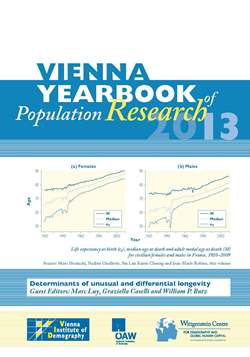
Vienna Yearbook of Population Research 2013, pp. 247-266, 2024/12/12

The aims of this study are to analyse the two-way association between women fertility and longevity, and parental transmission of longevity. The wealth of information gathered in the AKeA2—demographic survey on Sardinian centenarians—have been used by applying Logistic Regression Models. For the association between longevity and fertility, we find evidence that *long livers benefit from factors related to the timing of fertility (in particular the age at birth of the last child) that the literature suggests may foster longevity. Regarding the association with parental transmission, it seems to have significant effects for women but not for men. We always found that a higher birth order decreases the probability of becoming a centenarian. There is a negative effect of a higher father age at birth on the longevity of female offspring. The latter suggests that long-lived women seem to have been favoured both by their own late fertility and young paternal age at the moment of their own procreation.
Keywords: Longevity; Woman Fertility; Demography